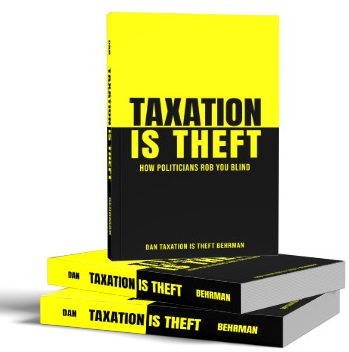At first glance, saying that nobody should have to work sounds like something Karl Marx would be happy to hear. It’s actually quite the opposite.
Right now everyone is afraid of what will happen with this lockdown. Many people can’t get to work, businesses aren’t bringing in the same revenue, people are worried about getting evicted or falling behind on their bills. There is a lot of fear that is all built on top of a foundation of the expectation that money will always keep circulating at an ever increasing rate.
For months leading up to the Coronavirus shutdown, many people were talking about how strong the economy was. The markets were reaching record highs and unemployment was at record lows. But it seems that it all went away in the blink of an eye. How could that be possible?
The economy, of course, is made up of people. While everyone was focusing on the health of the economy, they were not focusing on the financial health of the people who run it. 87% of US households are in debt. Few own their homes outright, while most are either renting, or making mortgage payments. Most Americans are so vulnerable that losing their job for just a few months could completely destroy them.
Why do we do this to ourselves? Or… is someone doing this to us?
The Economy
The economy is measured by how much we produce. The more we produce and sell, the higher the GDP rises. In order to grow that number, we need to be more productive or sell more products and services. We need people to work more hours.
How can you do that if people have better things to do than work? You make them work. I know this sounds like slavery, and we can’t possibly all be slaves because we can’t see any shackles around our ankles or feel a whip cracking on our backs. Stay with me for a minute.
If someone needs to earn $1000 per month to pay their bills and have enough left over for some creature comforts, and if they can earn that by working 40 hours every week, then they might work 40 hours. If the government comes along and takes half of that, leaving them with only $500, then they might have to work 60 hours just to pay the bills before they have anything left over for themselves. On the flip side, if you can make their $1,000 monthly expenses rise to $1,500 by adding in property taxes, sales taxes, gas taxes and more – you can also make them work harder.
Federal Housing Administration (FHA)
It’s not just taxes that make it more expensive to live. Regulations and government programs make it more expensive to become self-reliant. For example, the FHA has made houses cost more than 4 times what they did before. This was done with the intent of making it easier for people to get home loans, but it has only inflated the market, putting people in debt for much longer.
Before the FHA, a typical home loan might have been 40% down and paid off in 5 years. The current FHA standard is 3% down and paid off in 30 years. Typical when getting approved for a loan, the most important question is “how much can you afford to pay every month?” If that amount is $1,000, let’s consider how much you can borrow before and after FHA:
| Before FHA | After FHA | |
| Monthly Payment | $1,000 | $1,000 |
| Interest Rate | 9% | 3% |
| Years | 5 | 30 |
| Months | 60 | 360 |
| Total payments (before interest) | $60,000 | $360,000 |
| Total to borrow | $48,175 | $237,200 |
| Down payment | $40,000 | $11,000 |
| Total payments | $100,000 | $371,000 |
| Actual purchase price | $88,175 | $248,200 |
Before the FHA was in place, banks knew there was risk to every loan. To offset risk, they would require bigger down-payments, and each monthly payment would pay a larger percent of the loan. If the government protects them against risk, and bank is willing to lend you almost four times as much, you have a lot more money to offer on any home you could buy. This is exactly what we saw leading up to the 2008 housing crisis. Banks were ordered by the government to give out more money than ever before. They used interest only loans to justify much bigger loans with the same payments.
Because of the extra money available for purchasing homes, housing prices skyrocketed. That bubble busted, but we are still living in a world where houses cost 2.8 times what they would without government interference. And we are paying loans for 6 times as long as we would be, paying 3.7 times as much in total.
Unemployment
Did you ever wonder why the government is so concerned about reaching a 0% unemployment rate? They want to keep us all busy. The harder we work, the higher the GDP.
But shouldn’t everyone have to work just to stay alive? We still have to pay for food right?
Sure, there are always expenses and things we want to buy. It would be a pretty boring life to not have the small luxuries that keep us entertained, but when it comes to food, many people used to grow their own. That’s been largely outlawed with bans on owning livestock, hunting, collecting rainwater, and disconnecting from the electric grid. Without government policy, we’d be able to provide much more for ourselves. This doesn’t mean everyone would have to provide everything for themselves, The more we can provide for ourselves, however, the less we depend on money. If the entire economy were to shut down, we’d be able to survive much longer, without any bailout programs from the government.
Where do we go from here?
During the lockdown, I have seen many people who can’t work being more productive than they have ever been. They finally have time to work on those projects around the house, build something, learning something new, or somehow improve their own lives in ways that money just can’t buy.
Through these actions, it’s evident to see that we have taken our skills and abilities to survive for granted, and started to believe over time that the government knows what’s better for us and our families than we do. While the world is on edge because of this global crisis, some of us are learning how to rely on ourselves and practice our individual freedoms again. People are not property of the government, the government does not own them, and this might be just the situation for people to embrace that.

